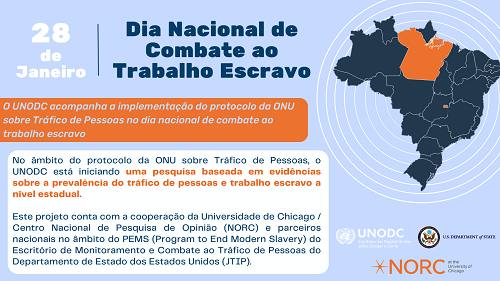
Brasília, 28 January 2022 – On 28 January, Brazil commemorated the National Day to Combat Forced Labour. The date was instituted in honour of three tax auditors who died on January 28, 2004, while investigating allegations of forced labour in farms in Unaí, MG.
On this date, the United Nations Office on Drugs and Crime (UNODC) and its partners seek to increase awareness and debate about forced labour, which is outlawed in article 149 of the Penal Code and comprises one of several purposes for human trafficking, pursuant to Law nº 13.444 of October 6, 2016.
As guardian of the United Nations Convention against Transnational Organized Crime (Palermo Convention) and the Additional Protocol on the Prevention, Suppression and Punishment of Trafficking in Persons, UNODC has a mandate to support Member States to improve their responses to this crime. Since 1995, the Labour Inspection of the Ministry of Labour and Welfare has identified 56,722 workers in a situation of forced labour.
Under the UN Protocol on Trafficking in Persons, UNODC will conduct evidence-based research actions on the prevalence of trafficking in persons and forced labour, in cooperation with the University of Chicago/National Opinion Research Center (NORC) and national partners, under the global Program to End Modern Slavery (PEMS) of the Office of Monitoring and Combating Trafficking in Persons of the United States Department of State (TIP Office).
The study will seek to foster knowledge to inform future efforts to combat human trafficking and forced labour.